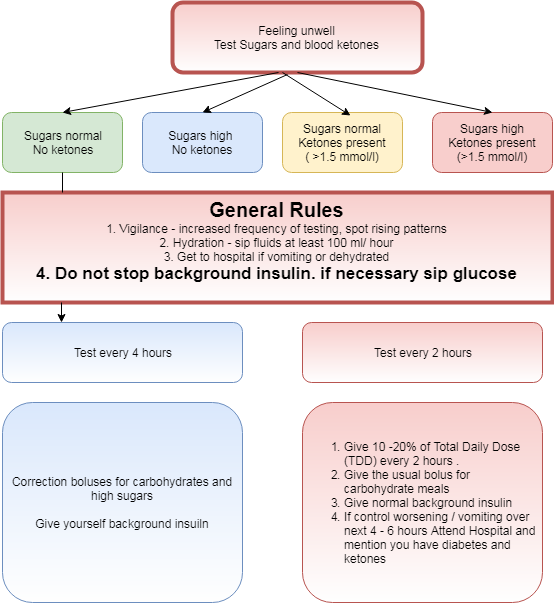Sick Day rules
Feeling unwell? Remember your sugars will change depending on various factors
Type 2 /Type 1 Diabetes
Feeling Feverish, mild breathlessness and cough
- Continue all your medications.
- Take plenty of fluids, particularly water
- Contact us for a blood glucose meter if you need one, We may be able to deliver it for those in the shielded category. You can ask a friend to pick it up
- Take small meals – You do require carbohydrates at this time
- DO NOT STICK TO LOW CARB PLAN
Any two of the following – Fever > 38 degrees, vomiting, feeling dry, vomiting, diarrhoea
- STOP the following and Restart when you are well (usually after 24 to 48 hours of eating and drinking normally).
- ACE inhibitors: names ending in ‘pril’ such as ramipril, lisinopril, perindopril
- ARBs: names ending in ‘sartan’ such as candesartan, irbesartan, losartan, valsartan
- Diuretics: e.g. bendroflumethiazide, furosemide, indapamide, bumetanide. If you are taking more than two tablets a day of bumetanide or furosemide please seek medical advice before stopping
- Metformin
- GLP-1 analogues: e.g. exenatide, dulaglutide, liraglutide, lixisenatide, semaglutide
- NSAIDs: e.g. ibuprofen, naproxen
- SGLT2 inhibitors: names ending with ‘flozin’ such as canagliflozin, dapagliflozin, empagliflozin, ertugliflozin
- Please read section on Type 2 Diabetes as well (below)
Type 1 Diabetes
How to manage type 1 diabetes if you become unwell
• If you develop Coronavirus symptoms or any other illness it is likely to affect your blood sugars
• While you are unwell it is very likely you will need to take more insulin
• Even if you are vomiting you must never stop taking your insulin
• Monitor your urine or blood for ketones every 2 hours
• Monitor blood sugar levels once every 2 hours
• Drink at least ½ cup (100ml) of water every hour
• Try to eat some food which contains carbohydrates e.g. yoghurt, toast, ice cream and cereal
• You will need face to face medical attention if you are continuously vomiting for more than 4-6 hours
or if your ketone levels are not reducing despite following sick day rules
Type 2 Diabetes Mellitus
If you develop Coronavirus symptoms or any other illness, it is likely to affect your blood sugars
• While you are unwell it is very likely that your blood glucose will increase even if you are eating less than usual
• You may find that because of reduced appetite or inability to eat your usual meals, some tablets (particularly sulphonylureas: names ending with ‘ide’ such as gliclazide, glibenclamide, glipizide) may cause low blood sugars
• If you already have access to blood glucose monitoring, increase the frequency of checking your blood glucose to every 2-4 hours
• If you do not have access to blood glucose monitoring, look out for symptoms of high blood glucose (thirst, passing more urine than usual and tiredness) – seek medical advice if you have these symptoms
• Ensure you stay hydrated (drink at least ½ cup (100ml) of water every hour) and maintain carbohydrate intake
• If you are unable to eat or drink or are vomiting, replace meals with sugary fluids or ice cream
• Never stop insulin: you may have to adjust the dose
• Seek medical attention if you are unable to control your blood glucose (persistently over 18mmol/l) or unable to stay hydrated due to vomiting
Your stress hormone levels, your food intake, your fluid intake , your activity levels all will change your blood sugars levels further more ketone production may start. ALTHOUGH THIS IS MAINLY FOR THOSE WITH TYPE 1 DIABETES.. IT MAY BE APPLICABLE FOR ALL TYPES OF DIABETES..
If you are have Type 2 diabetes you can still get ketoacidosis.. Are you on an SGLT 2 inhibitor? They can be called Empagliflozin, Dapagliflozin, Canagliflozin, sotagliflozin…Please go to A and E and mention you have ketones and take your tablets with you. You may have NORMOGLYCEMIC KETOACIDOSIS.
